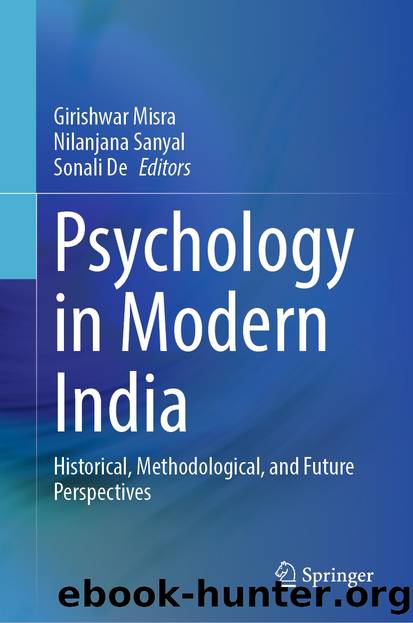Psychology in Modern India by Unknown

Author:Unknown
Language: eng
Format: epub
ISBN: 9789811647055
Publisher: Springer Singapore
Philosophy of SR
As Einstein has put it, a scientific truth is not the same as a truth. This idea is difficult to swallow. This suggests that some theories are false in sciences. Science produces knowledge which is consistent, reliable, and reproducible but it may not be a truth always. That is why grand theories are challenged, and new theories have been emerging on the same phenomena.
There were oppositions to the conventional positivist approach and quantitative methodology. First, when an apple fell from the tree, it was inferred that the apple was attracted by the gravitational force of the earth, but no one has observed the existence of gravitational force. Here the outcome is observable but not the cause being gravitational force. In social sciences, the mental process of memory is not directly observable but its outcomes in remembering words and digits, and of intelligence in solving complex problems are observable. Similarly, motivation and job satisfaction being the antecedents are not directly observable but their outcomes in employeesâ effort in work-settings are observable. The logic of inference is same in psychology as in natural sciences; therefore, RM was scientific. Second, unlike the physical objects and lower species, human beings are participants in social sciences. They can think, talk, react, and their behaviors depend on the situation. This is elaborated in contingency approach. The subject may not willingly cooperate or participate in the study, may try to please or deceive the researcher, give ideal responses to psychological inventories, and may show off or sabotage the study, and so on that can seriously distort results of research. Third, in natural sciences, variables that influence the outcomes are limited and can be controlled in a lab. In social sciences, multiplicity of factors operates on human beings under investigation and the investigative phenomenon is multifaceted. Numerous factors that operate on human beings are dynamic in nature, and a few variables can be controlled in studying human beings. Lastly, a research issue may not elicit standardized, fixed response categories from human beings. With the researcherâs sensitivity to the relationships with the respondents, they may supply far richer and illuminating views beyond the standardized response categories in close-ended questions and psychological inventories. Therefore, the RM that applies to physical and biological sciences may not be exactly applicable to study of human beings. Unlike natural sciences that emphasizes perfect accuracy, the study of absolute behaviors, experiences, and mental processes in social sciences may not reveal identically the reality.
Download
This site does not store any files on its server. We only index and link to content provided by other sites. Please contact the content providers to delete copyright contents if any and email us, we'll remove relevant links or contents immediately.
| Anthropology | Archaeology |
| Philosophy | Politics & Government |
| Social Sciences | Sociology |
| Women's Studies |
The remains of the day by Kazuo Ishiguro(7551)
Tools of Titans by Timothy Ferriss(6947)
The Black Swan by Nassim Nicholas Taleb(6191)
Inner Engineering: A Yogi's Guide to Joy by Sadhguru(5897)
Giovanni's Room by James Baldwin(5878)
The Way of Zen by Alan W. Watts(5800)
The Six Wives Of Henry VIII (WOMEN IN HISTORY) by Fraser Antonia(4790)
The Power of Now: A Guide to Spiritual Enlightenment by Eckhart Tolle(4755)
Astrophysics for People in a Hurry by Neil DeGrasse Tyson(4620)
Asking the Right Questions: A Guide to Critical Thinking by M. Neil Browne & Stuart M. Keeley(4574)
12 Rules for Life by Jordan B. Peterson(3734)
The Ethical Slut by Janet W. Hardy(3503)
Skin in the Game by Nassim Nicholas Taleb(3460)
Housekeeping by Marilynne Robinson(3401)
The Art of Happiness by The Dalai Lama(3384)
Double Down (Diary of a Wimpy Kid Book 11) by Jeff Kinney(3272)
Skin in the Game: Hidden Asymmetries in Daily Life by Nassim Nicholas Taleb(3264)
Walking by Henry David Thoreau(3234)
12 Rules for Life: An Antidote to Chaos by Jordan B. Peterson(3200)
